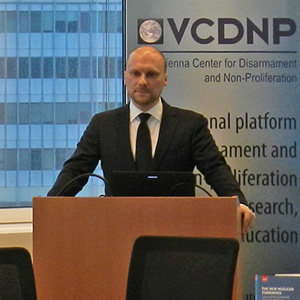

On 15 October 2015, the VCDNP hosted a seminar by Vitaly Fedchenko, a Senior Researcher at the Stockholm International Peace Research Institute (SIPRI), to discuss the findings of a new SIPRI volume he edited titled, "The New Nuclear Forensics: Analysis of Nuclear Materials for Security Purposes."
Mr. Fedchenko began his presentation by looking at the definition of "nuclear forensics" and the applications for which it could be useful. The term "nuclear forensics" in general, he said, is one that deals with the application of nuclear science to nuclear law. He explained that forensics enables the "reconstruction" of the source and history of nuclear material, and spoke of its role both in tracing the origin of interdicted material and potential role in investigations following a nuclear explosion. He argued that there exists a whole range of analytical tools used to trace the history and point of origin of nuclear material and that while each tool could be addressed in isolation, it is better to consider them holistically, under the useful umbrella term of "nuclear forensics." Such a point is not semantic, he emphasized, but rather an important conceptual framework employed in his book.
The forensics process, as he described it, involves three steps: sample collection (i.e. gathering material for analysis); "characterization" (i.e. measuring the material to produce data); and interpretation of that data (to draw conclusions). Among the more common applications of nuclear forensic techniques, Mr. Fedchenko highlighted law enforcement and counter-terrorism, non-proliferation (including verification of treaties such as the Treaty on the Non-Proliferation of Nuclear Weapons and the Comprehensive Nuclear Test Ban Treaty, and specific investigations, such as that carried out by the IAEA in Iraq in the early 1990s), and the verification of bilateral arms control agreements by national technical means.

The book, designed for a non-specialist audience, deals with a range of these aspects. It covers topics such as the basic process of nuclear forensic analysis; the use of various destructive and non-destructive analytical tools; a compendium of nuclear forensic signatures relevant for both the nuclear fuel cycle and "post-explosion environments" and, in a section on the use of nuclear forensics in practice, a description of the origins of nuclear forensic analysis in the United States, the Soviet Union and Sweden. The book also contains a number of examples of the use of nuclear forensic analysis in various international security frameworks.
In terms of readership, Mr. Fedchenko argued that the book could be useful to a broader audience beyond those in the field of nuclear engineering. He drew particular attention to the book's relevance for policy recommendations on nuclear security as well as in relation to the verification of current and future treaties.